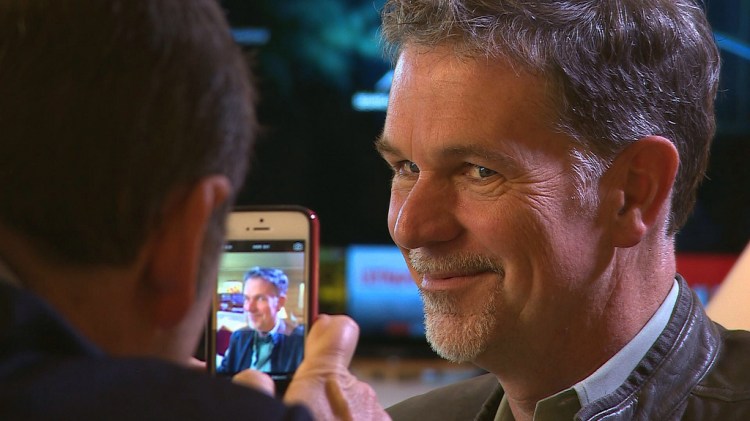There he goes again. Netflix CEO Reed Hastings is getting lots of play for his net neutrality tirades, and it never gets old. Because he’s so good at it.
You will not find a more capable spokesperson for the cause, even if Netflix has a clear financial interest in a neutral Internet.
Hastings spoke today at Re/code’s Code Conference event, and he was again on his game.
The target of most of Hastings’ net neutrality ire lately has been Comcast, which Netflix is currently paying to deliver its streaming video content to millions have households.
Hastings doesn’t understand why Internet companies like his have to pay Comcast so much to deliver their content down to the household, when Comcast’s customers are already paying Comcast a lot each month for broadband service. Comcast, Hastings says, is “double dipping.”
“They want the whole Internet to pay them for when their subscribers use the Internet,” Hastings said of Comcast. “Should Comcast be able to charge everyone else for access to their subscribers?”
Hastings says the money it’s paying Comcast and other ISPs right now isn’t hurting too badly, but it’s likely to get worse. “If [they] charge a little bit now, they’ll charge more and more and more,” Hastings said. And cable companies have a habit of slowly ratcheting up prices, carefully feeling out what the market will bear.
The most recent net neutrality flashpoint has been Comcast’s proposed acquisition of Time Warner Cable, which would give Comcast control over more than a third of the wired broadband lines in the U.S. Comcast and Time Warner Cable, by the way, share the distinction of ranking among the worst pay-TV companies for customer satisfaction.
The recent news that AT&T wants to acquire DirecTV doesn’t help; it could consolidate the home broadband market even more, removing competition and potentially allowing prices to go up.
Hastings isn’t terribly excited about a governmental solution to the net neutrality problem, he says, but feels that it may be the only way.
Major Internet content providers like Netflix and Google have in recent years been working more closely (on a paying basis) with broadband providers to make sure their content reaches users at high speeds and at high quality. Hastings said today that his company is forced to pay Comcast “because the deal was better than the prior state; we felt we had to.”
Big ISPs like Comcast, too, have a great interest in delivering web content quickly — if users are seeing a lot of quality degradation and slow-loading, crashing, or stopping during “Orange is the New Black,” the first throat they will choke might be their Internet provider. But for whatever reason, Comcast and other ISPs seem to have the upper hand in the slow battle over who pays the freight for Web traffic.
Netflix now boasts 35.7 million domestic subscribers and says it will enter France, Germany, and four other European countries later this year.
Netflix’s biggest strategic move in the past five years has been the development of its own shows. The second season of its first big hit, “House of Cards,” now has “a huge audience that would make any cable or broadcast network happy,” Hastings said recently.
Netflix will start airing the second season of its other hit, “Orange Is the New Black,” June 6. Yes, I will watching and/or binging.
VentureBeat's mission is to be a digital town square for technical decision-makers to gain knowledge about transformative enterprise technology and transact. Learn More

